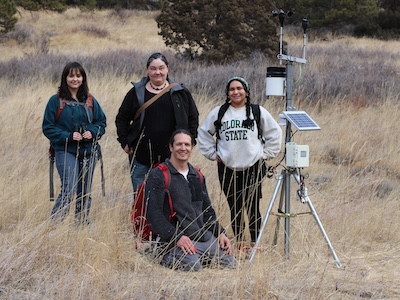This project seeks to understand the history and impacts of Indigenous and settler-colonial water policy and management practices in the Colorado River Basin (CRB) and Poudre River Basin (PRB).

Objectives:
- Document implications of historic shifts in water governance, policy, and management, with an emphasis on Indigenous Nations and communities, through the following questions:
a) Whose worldviews are represented and/or prioritized in policy and practices?
b) Who serves to benefit and who is disadvantaged?
c) Whose rights are upheld and what rights are eroded? - Construct a dynamic visual timeline that can serve as an education and outreach resource emphasizing Indigenous contributions, perspectives, experiences, and legal interpretations regarding water policy and management practices in CRB and PRB.
- Conduct a literature review assessing challenges and opportunities, such as monitoring and quantification approaches, language concepts (e.g. “beneficial use”), policy mechanisms, etc.
- Through a series of focus group discussions and interviews with subject matter experts identify and refine key themes across the literature accounts to document ongoing challenges and opportunities faced by Indigenous Nations and communities.
Charter Summary:
Tribes and Indigenous communities hold the longest history of land and water stewardship in the Intermountain West, including holding inherent rights and responsibilities to the waterways. Climate change and other social and environmental challenges continue to stress water availability and quality in the region, motivating a re-examination of settler-colonial policies and practices governing water management. With the guidance of our Indigenous Advisory Council, our project seeks to understand the history and impacts of Indigenous and settler-colonial water policy and management practices in the Colorado River Basin (CRB) and Poudre River Basin (PRB). This involves 1) Deconstructing and reconstructing a timeline/cycle through archival research to understand major shifts in policy and management of these river basins, with an emphasis on the ways in which different worldviews, rights, and benefits are represented and supported, or disregarded in these historic shifts; 2) Identifying challenges and opportunities through literature review, for tribal and Indigenous-led water stewardship in contemporary water management; and 3) Developing recommendations and baseline data for environmental monitoring and restoration in the Poudre River Basin to serve CSU Native American Cultural Center’s new field site. In our process we are working closely with community partners to co-design our project, including methods for data collection, pathways for recontextualizing Indigenous data and stories, and to co-design Indigenous educational materials that can serve K-12, higher education, and community learning curriculum needs in the region. We also aim for our charter project outputs to serve to provide region-specific context for furthering research and policy development relevant to Indigenous and tribally-led water management.
Primary Contacts
- Dominique David-Chavez (CSU)
Team Members
- Aditi Bhaskar (UC Boulder)
- Crystal Cooke (CSU)
Graduate Students
- TR Heydman (CSU), PhD
- Co-funded by the NSF GRFP
- Griselda Landa-Posas (CSU), MS
- Tamara Layden (CSU), PhD
Undergraduate Students
Funded by the Rocky Mountain Alliance for Minority Participation Program and CSU Native American Cultural Center
- Camille Britt (CSU)
- Miya Chavez (CSU)
- Brianna Maxwell (CSU)
- Jhonnie Porter-Salcido (CSU)
- Jesus Trevino (CSU)
Indigenous Advisory Council
- Ty Smith (CSU)
- Susan Faircloth (Two Feathers Consulting, LLC)
- Yufna Soldier Wolf (Northern Arapaho Tribe)
- Andrew Curley (UA)
Community Partners
- CSU Native American Cultural Center
- Indigenous Land & Data Stewards Lab
- IndigeLab Network
- ISTAR (Indigenous Science, Technology, Arts, and Resiliency) Program & Fort Collins Museum of Discovery
- Northern Arapaho Tribe
- CSU Summer Extension Internship Program
- CSU Rocky Mountain Alliance for Minority Participation
- Trees, Water & People